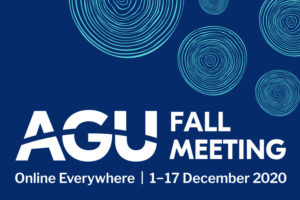Legal Education for Scientists at #AGU20
 The Climate Science Legal Defense Fund (CSLDF) and American Geophysical Union (AGU) work together to help scientists from all geoscience disciplines understand their legal rights and responsibilities—knowledge that’s an essential part of every researcher’s professional development. This is the ninth year we’ve partnered with AGU on the Legal Education for Scientists Program, and we’re offering a range of events at the 2020 AGU Fall Meeting.
The Climate Science Legal Defense Fund (CSLDF) and American Geophysical Union (AGU) work together to help scientists from all geoscience disciplines understand their legal rights and responsibilities—knowledge that’s an essential part of every researcher’s professional development. This is the ninth year we’ve partnered with AGU on the Legal Education for Scientists Program, and we’re offering a range of events at the 2020 AGU Fall Meeting.
Among our events are three workshops featuring attorneys from CSLDF and the American Civil Liberties Union (ACLU), and climate scientist and whistleblower Maria Caffrey.
Whether you’re actively involved in science activism or curious about the future of science post-election, we encourage you to participate in these activities and increase your legal knowledge.
Please note: The best way to join these events is to login to the meeting and navigate to them via the top menu: Program>What’s On.
Free Legal Advice for Scientists
CSLDF attorneys are providing free, confidential meetings to scientists from all disciplines who have legal questions or concerns related to their work; these will be held over Zoom or on the phone. Email lawyer@csldf.org to make an appointment.
Strengths and Limitations of Scientific Integrity Policies: Wednesday, December 2 from 9:00–10:00 a.m. ET
Many government agencies have scientific integrity policies to protect against violations of scientific and ethical standards, but these policies vary widely and do not always issues such as censorship and political interference. Climate scientist Maria Caffrey will speak about her personal experience with scientific integrity issues in the federal government. CSLDF attorney Augusta Wilson will also discuss what scientists should know when encountering potential censorship or political interference, and opportunities for reforming these policies.
Climate Science in the Courtroom: How Scientists Can Inform Climate Litigation and the Law: Wednesday, December 9 from 7:00–8:00 p.m. ET
Increasingly, cases related to climate change are coming before courts of law. These cases often involve questions of climate science that courts have historically been ill-prepared to address. The guiding question of this Town Hall is, “how can climate science and scientists effectively and responsibly inform decision-making in judicial branches?” CSLDF director and attorney Lauren Kurtz is part of a group that will explore both scientific and legal perspectives on the role of climate science in the courtroom and initiatives underway to build climate science literacy within the judiciary and legal literacy among scientists.
How Congressional Oversight Has Hurt and Helped Science: Thursday, December 10 from 9:00–10:00 a.m. ET
In this session, CSLDF attorneys will examine recent Congressional actions and their effects on science, and discuss necessary versus inappropriate uses of Congressional oversight powers. They will also discuss suggestions for potential reform measures that would improve how the next Congress treats science, including ways in which scientists can safely engage with their representatives.
Science and the First Amendment: Tuesday, December 15 from 9:00–10:00 a.m. ET
Both publicly and privately employed scientists should understand how First Amendment protections have been applied to scientific research, as well as limitations on First Amendment rights. CSLDF and ACLU attorneys will discuss how First Amendment rights have been used to protect free speech on university campuses, the rights of scientists to engage in political speech, public protest rights for scientific and other demonstrations, and how the Supreme Court has treated academic freedom.